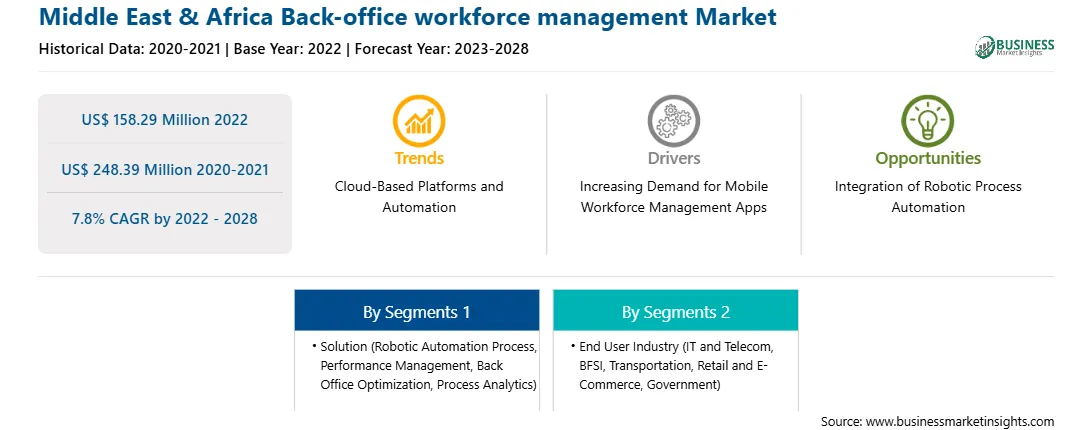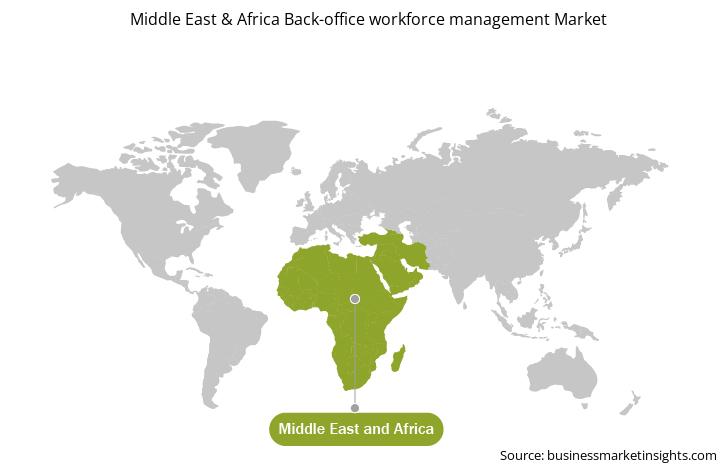Middle East & Africa Back-office workforce management Market
No. of Pages: 124 | Report Code: BMIRE00027198 | Category: Technology, Media and Telecommunications
No. of Pages: 124 | Report Code: BMIRE00027198 | Category: Technology, Media and Telecommunications
Companies are increasingly preferring app-based workforce management platforms to create smart workplaces. Reluctance toward embracing the benefits of mobility may cost them a fortune, especially in the longer run, by triggering inefficiencies and employee dissatisfaction. A mobile application creates a central hub to provide consistency in employee experience. With location monitoring, businesses can deliver hyper-local content and send real-time alerts and notifications to their employees. When location monitoring is integrated into the application, location monitoring further helps deliver relevant and timely experiences while increasing efficiency, productivity, and engagement of the employees. Mobile applications make it simple to enter workers’ official day count and other related information in data systems. Apps serve as a single hub combining all digital touchpoints associated with the management into a seamless, user-friendly platform. Making all work-related materials available on a single app allows enterprises to ensure the seamless functioning of employees, both, on campus and at home. Management teams can communicate and collaborate with coworkers and the firm via official mobile apps. Moreover, these apps can automatically capture the arrival time of employees at their perspective workstations. Such benefits of mobile app-based solutions for workforce management are creating growth opportunities for the back-office workforce management market players.
Businesses in the Middle East are laying out ambitious transformation roadmaps to ensure their relevance in the digital world. The adoption of third-party platform technologies, including cloud, mobility, and social media, is growing in the region. Large companies are willing to optimize their workforces and operate efficiently. In November 2020, Johnson Controls, the global leader in smart and sustainable buildings, announced the launch of a new suite of flexible services for its customers in the Middle East & Africa. To provide these services, Johnson Controls will leverage its Open Blue digital technology, combined with its 130 years of experience in the green building business, to deliver remote and contactless services. Industrial Revolution 4.0, 5G infrastructure, and digital transformation are growing significantly in the Middle East & Africa. Further, the advent of large-scale, advanced cloud service providers is expected to trigger the adoption of secure cloud-based services in the region. South Africa is at the forefront of adopting cloud-based services, with Microsoft takes advantage of Microsoft Azure's general availability to open its first data center in Africa. Additionally, AWS opened its AWS Africa in 2020, suggesting a greater need for workforce management solutions in the Middle East & Africa. The highest market growth in the region is estimated to be in Saudi Arabia.
Strategic insights for the Middle East & Africa Back-office workforce management provides data-driven analysis of the industry landscape, including current trends, key players, and regional nuances. These insights offer actionable recommendations, enabling readers to differentiate themselves from competitors by identifying untapped segments or developing unique value propositions. Leveraging data analytics, these insights help industry players anticipate the market shifts, whether investors, manufacturers, or other stakeholders. A future-oriented perspective is essential, helping stakeholders anticipate market shifts and position themselves for long-term success in this dynamic region. Ultimately, effective strategic insights empower readers to make informed decisions that drive profitability and achieve their business objectives within the market.

| Report Attribute | Details |
|---|---|
| Market size in 2022 | US$ 158.29 Million |
| Market Size by 2028 | US$ 248.39 Million |
| CAGR (2022 - 2028) | 7.8% |
| Historical Data | 2020-2021 |
| Forecast period | 2023-2028 |
| Segments Covered |
By Solution
|
| Regions and Countries Covered | Middle East and Africa
|
| Market leaders and key company profiles |
|
The geographic scope of the Middle East & Africa Back-office workforce management refers to the specific areas in which a business operates and competes. Understanding local distinctions, such as diverse consumer preferences (e.g., demand for specific plug types or battery backup durations), varying economic conditions, and regulatory environments, is crucial for tailoring strategies to specific markets. Businesses can expand their reach by identifying underserved areas or adapting their offerings to meet local demands. A clear market focus allows for more effective resource allocation, targeted marketing campaigns, and better positioning against local competitors, ultimately driving growth in those targeted areas.

The Middle East & Africa back-office workforce management market is segmented into solution, end user, and country. Based on solution, the market is segmented into robotic automation process, performance management, back-office optimization, process analytics, and others. The robotic automation process segment held the largest market share in 2022.
The Middle East & Africa Back-office workforce management Market is valued at US$ 158.29 Million in 2022, it is projected to reach US$ 248.39 Million by 2028.
As per our report Middle East & Africa Back-office workforce management Market, the market size is valued at US$ 158.29 Million in 2022, projecting it to reach US$ 248.39 Million by 2028. This translates to a CAGR of approximately 7.8% during the forecast period.
The Middle East & Africa Back-office workforce management Market report typically cover these key segments-
The historic period, base year, and forecast period can vary slightly depending on the specific market research report. However, for the Middle East & Africa Back-office workforce management Market report:
The Middle East & Africa Back-office workforce management Market is populated by several key players, each contributing to its growth and innovation. Some of the major players include:
The Middle East & Africa Back-office workforce management Market report is valuable for diverse stakeholders, including:
Essentially, anyone involved in or considering involvement in the Middle East & Africa Back-office workforce management Market value chain can benefit from the information contained in a comprehensive market report.